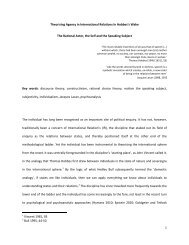biological sciences HONOURs 2014 - The University of Sydney
biological sciences HONOURs 2014 - The University of Sydney
biological sciences HONOURs 2014 - The University of Sydney
You also want an ePaper? Increase the reach of your titles
YUMPU automatically turns print PDFs into web optimized ePapers that Google loves.
EVOLUTION OF<br />
SOCIALITY<br />
29<br />
Research Interests<br />
Sociality is a widespread phenomenon in nature that can<br />
take many forms, from temporary aggregations <strong>of</strong> dozens <strong>of</strong><br />
individuals to colonies <strong>of</strong> thousands <strong>of</strong> individuals working<br />
together as a ‘superorganism’. <strong>The</strong> goal <strong>of</strong> my research is to<br />
understand why and how such social diversity has evolved<br />
by studying the mechanisms <strong>of</strong> social behaviour in species<br />
exhibiting various levels <strong>of</strong> social complexities. To address<br />
this goal, I use a combination <strong>of</strong> behavioural experiments on<br />
a range <strong>of</strong> sub-social and social insect species and computer<br />
simulations <strong>of</strong> evolutionary models. My previous work includes<br />
empirical and theoretical examinations <strong>of</strong> the social biology <strong>of</strong><br />
cockroaches, bumblebees and fruit flies.<br />
<strong>The</strong> aim <strong>of</strong> my current projects, in collaboration with Pr<strong>of</strong>essor<br />
Steve Simpson, is to explore the role <strong>of</strong> nutrition in the<br />
mechanism and the evolution <strong>of</strong> sociality. We will develop<br />
laboratory experiments (probably on fruit flies - Drosophila)<br />
using various spatial arrangements <strong>of</strong> artificial diets and<br />
automated video tracking systems to investigate the nutritional<br />
underpinnings <strong>of</strong> a range <strong>of</strong> simple social phenomena such as:<br />
aggregation, group synchronisation and collective decisions.<br />
We will also develop agent-based models to explore these<br />
phenomena in silico. <strong>The</strong> ultimate goal is to generate a general<br />
Dr Mathieu Lihoreau<br />
Room 320, Heydon-<br />
Laurence Building A08<br />
T: (02) 9351 3259<br />
E: mathieu.lihoreau@<br />
sydney.edu.au<br />
conceptual framework to examine how nutritional constraints contribute to the evolution <strong>of</strong><br />
social behaviour and structures <strong>of</strong> in animal groups <strong>of</strong> increasing complexities.<br />
Honours projects<br />
Several specific questions could be asked during an Honours project:<br />
1. How does the spatio-temporal availability <strong>of</strong> nutrients (proteins, carbohydrates, fat) in the<br />
environment affect collective behaviour?<br />
2. How does this vary in mixed groups where individuals have different nutritional needs<br />
(males vs females, hungry vs well fed individuals)?<br />
3. Do the same principles apply to walking and flying animals?<br />
4. Do the same principles apply to herbivores, carnivores and omnivores?<br />
5. What features <strong>of</strong> the nutritional environment may lead to the evolution <strong>of</strong> different social<br />
organisations? Over what timescale?
















